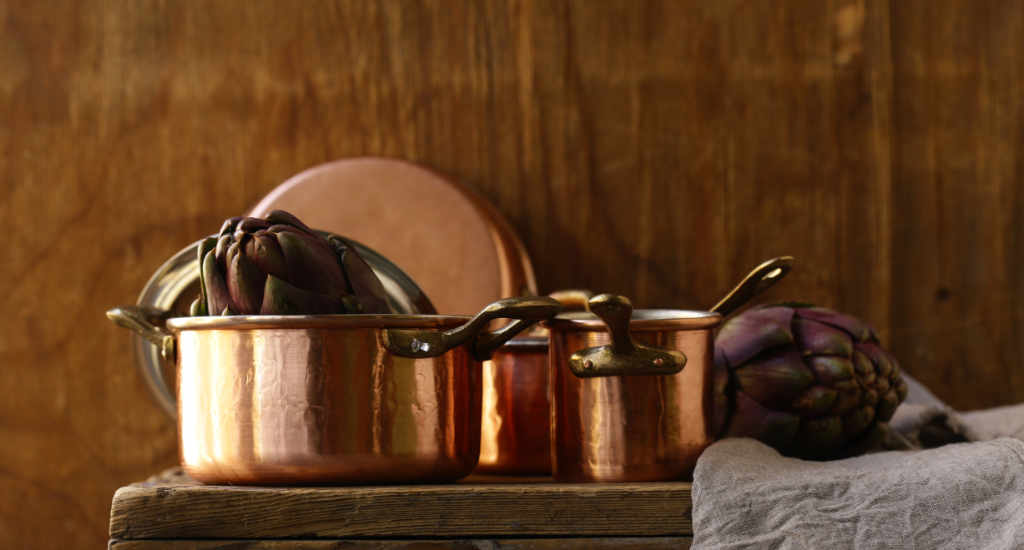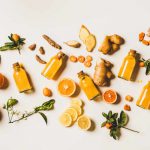In this era of Covid – all of us have become extra cautious about our health and lifestyle. We are trying to create a healthier kitchen to prepare, dish up and store healthy food. While giving due importance to safe food, we just cannot ignore the concept of durable and safe kitchenware to cook homemade healthy meals. People are confused between types of vessels good for cooking especially between copper vs aluminium.
It has been an age-old tradition to cook in vessels of ancient metals. It has almost been a significant part of each and every Indian household. The importance of best cookware or kitchenware used for cooking has a huge impact on the health of a person. Each and every type of utensils has its plus and minus points.
One of the basic points is that any utensil used for cooking should be tough and solid. It should be made up of substances that do not peel, chip, crack, dissolve, vaporize or allow any kind of bacterial growth. The utensil should be able to sustain different temperatures to a certain extent. It should also be easy to clean and it’s a bonus if it is aesthetically attractive as well. The method of cooking is an important factor while deciding about the cookware, as some cooking methods would work better and differently in certain materials. There are many different types of cookware in the market today, especially stainless steel, copper, aluminium, and bronze. This blog will help you understand that “is aluminium good for cooking” and “is copper good for cooking”.
The difficult and expensive tasks are to choose the right cooking materials. The primary point is that you got to choose from different materials based on your cooking methods and the sources of heat that you use in your kitchen. Also to understand the importance and benefits of both the types of vessels you can opt for online dietician consultation to get the right guidance.
Copper vs. Aluminium: Which Cookware Is Best?
The two of the main cookware’s we would be discussing are Copper and Aluminium. Copper vs. aluminium. To understand and know which cookware is the best, right thing to do is to ask a dietitian, who will guide you on it. At the same time, go through the below basic details to enlighten yourself with the facts about both these metals.
Copper cookware
Copper has been used as kitchenware since 9000 years. Cooking utensils made up of copper are ideal conductors of heat; they are hygienic, durable, and corrosion-resistant. Copper conducts heat 20 times better than stainless steel. Due to this excellent property of heat conductivity, the heat evenly spread in a copper vessel compared to the other materials. The danger of scorching is less as the temperature can be easily regulated; this helps to cook with less energy. Copper can store heat, so when meals are prepared in utensils made up of copper; they stay warm for a long period compared to other materials. Due to this property of copper, it makes a perfect base material for pans and pots.
Types of Copper Cookware
Now that we have understood the importance of copper, check out the different types of copper cookware that are available in the market. The copper utensils that are mostly sold in the market may not always be made up of pure copper. The copper pot should be made up of at least 90% of copper and not just a filmy coating of copper on stainless steel pot that will only serve the aesthetic part of it but won’t have the authenticity or the heat conductivity of the original copper.
There are two prominent variants of copper cookware in the market; they are tin-coated and steel-coated copper cookware. Traditionally copper pots are lined with tin. The chemistry behind it is that tin bonds with copper making it malleable so it melts into the lining of the copper pot. Tin provides good lining as it does not react with acid and is moderately non-stick compared to steel. One of the minus points of tin is that it has a low melting point and the copper vessels lined with tin have to be retinned occasionally.
Another variant of copper utensils lined with stainless steel is much popular in the market since steel is more durable compared to tin. However, copper does not bond well with stainless steel. These two materials do not have natural compatibility with each other hence they have to be bonded or forced together mechanically. Copper lined with steel is much more durable as compared to those lined with tin; however, they do not conduct the heat well. This hampers the power of copper. Another minus point of copper lined with steel is that the foods stick to steel. Still, the most preferred and used options of copper vessels are those that are lined with steel.
How to Shop Copper Cookware
Once we are aware of the concept of copper-lined vessels, another important parameter to note before buying copper cookware is the thickness of the copper vessel. This has a striking effect on the performance of the vessel. The standard norm is that the copper vessels or cookware should have a thickness of around 2.5 to 3 mm. Vessels with thicknesses more or less than this will not provide the required heat conductivity. Also, you won’t find copper vessels thicker than 3 mm due to their density and value. Such thick vessels are difficult to use as well. At the same time, you will easily get best copper cookware having thicknesses lesser than 2.5 mm. But be cautious to not use vessels with thicknesses lesser than 2 mm as it may look good but will not perform well. So remember to check the thickness of the copper vessels before paying for the same.
Benefits of Copper Cookware
One of the key points to be aware of before cooking in copper is that it is quite reactive. Acidic foods like tomatoes and vinegar may leach copper into the food, ingestion of copper over time may be toxic and this is precisely the reason why copper vessels are lined.
One of the common practices many of us follow is to store water in a copper vessel, keep it overnight and drink it first thing in the morning. Recent studies have proved the benefits of cooking in copper, food rich in copper boosts collagen. Hence copper is good for the skin as well. It is believed that since copper is related to fire and the sun, it increases the heat in the boat, which in turn increases the metabolic rate of the person. It also helps to improve bile secretion, increase hemoglobin, detoxify the body, and also aids in the peristaltic movement of the gut for better digestion. One of the major minus points of copper vessels is that they are quite expensive, need regular polishing to maintain their shine and they do not work on an induction stove. Frying in unlined copper vessels may leak copper into the food causing health issues.
How to Clean Copper Cookware
One of the other important things to know is how to clean copper ports as well as how to manage clean copper cookware. Once you have been using copper vessels, the outside of the vessel will age with time which is also known as patina. This can be easily cleaned by using a gentle sponge soaked in salt and lime juice mixture and then wash it with water and wipe it dry. When the copper utensils are not in use, store them in a dry place.
Aluminum Cookware
Moving onto the next contender to choose as the best metal for cooking is Aluminium. Aluminium Cookware, pans, and pots are being used since the 19th century till date and they have been popular amongst kitchen wares due to their heat conducting and non-sticking properties. Cookware’s made from aluminium are lightweight and inexpensive. Aluminium is one of the softest metals; hence it may dent and scratch easily. The thermal conductivity of aluminium is 16 times more than that of steel. It is found abundantly in nature hence it’s quite cheap, and that is the reason why aluminium cookware is quite affordable. Additionally, it is the preferred material for bakeware as well. Baking sheets and pan made up of aluminized steel are quite popular among professional bakers due to their corrosion-resistance, good heat transfer, and durability.
How to Use Aluminium Cookware and is it Safe?
There are safety concerns related to cooking in pure aluminium vessels. Question that comes on mind is aluminium pans safe? One of the facts about cooking in Aluminium is that during cooking, this metal leaches into the food and it may increase if the vessel is worn out or old. The longer the food is kept in the vessel, the more is the leaching of metal in the food. This may lead to constipation, liver disorders, paralysis, and even some other disorders.
Types of Aluminium Cookware
For this reason, Anodized aluminium is used majorly instead of aluminium. Anodized Aluminium? So, let us understand the chemistry part here, aluminium when exposed to air will form a thin layer of aluminium oxide on its surface. Though the layer may be thin, it is hard and strong. This forms a barrier between the air and the metal thus preventing any further oxidation of the metal. So to make the aluminium oxide layer thicker, the metal is treated with an electrochemical process known as anodization. This creates an extra thick layer of aluminium oxide that is known as Anodized aluminium. This anodized aluminium minimizes the leaching of aluminium cookware material into the food as compared to the regular aluminium as the metal is not in direct contact with the food. It also provides non-stick properties to some extent. You will come across types of aluminium cookware in the market to choose from.
How to Shop for Aluminium Cookware:
While shopping for the best aluminium cookware, always opt for anodized aluminium. Anodized aluminium utensils are quite easy to handle and lightweight. It does not peel or chip away any time soon, thus making it an investment in long-lasting cookware. It heats quickly and quite efficiently, and also heats evenly across the surface of the utensil.
Benefits of Aluminium Cookware:
Aluminium is a great heat conductor. The thermal conductivity of this metal is much greater than other metals, which means that it heats up quickly. Other benefits of aluminium cookware are it is easily available and quite lightweight and hence becomes the most preferred metal for cookware.
How to Cook and Clean Aluminium Cookware
In regards to cooking with aluminum, it’s recommended to cook over low or medium heat. Try not to cook on high heat, as it may lead to discoloration on the surface of aluminium vessels. Be careful with spoons and ladles used as it may scratch the non-stick feature over time. Try to use silicone, wooden, or polyethylene options. Do not cook foods that are highly alkaline or acidic as they tend to cause pitting in the coating of the vessel. Allow the vessel to cool before washing. Clean aluminium cookware by washing it with a soft sponge along with mild soap and water.
Conclusion:
Cooking is considered an art. Right from selecting the ingredients, cooking on a suitable flame till plating the food, each and every step requires a lot of consideration and effort. Amongst all this is equally important to select the right vessel for cooking. Buying cookware may be overwhelming, hence it’s important that you do research and then determines what is suitable for your cooking. Consider your budget and do a small analysis to decide on the best product. In regards to the tagline of this content, the apt answer is that both these metals are good for cooking, but copper has a better heat conductivity as compared to aluminium. At the same time, aluminium is cheaper compared to copper. But ensure that whichever cookware you buy should have a substantial amount of metal in it. Especially copper cookware would be thin to keep its cost down. Overall if we consider it, aluminium works best. It is important to remember that both metals when coated give better results compared to non-coated ones. Consulting a dietitian online to further clarify your apprehension will be helpful as well. Lastly, it’s advisable to buy cookware that lasts for a longer time to reduce any kind of environmental waste and also to control the metal and chemical exposure to food. Be sensible and smart while selecting your cookware so that you and your family can enjoy healthy and hygienic food from your kitchen.














